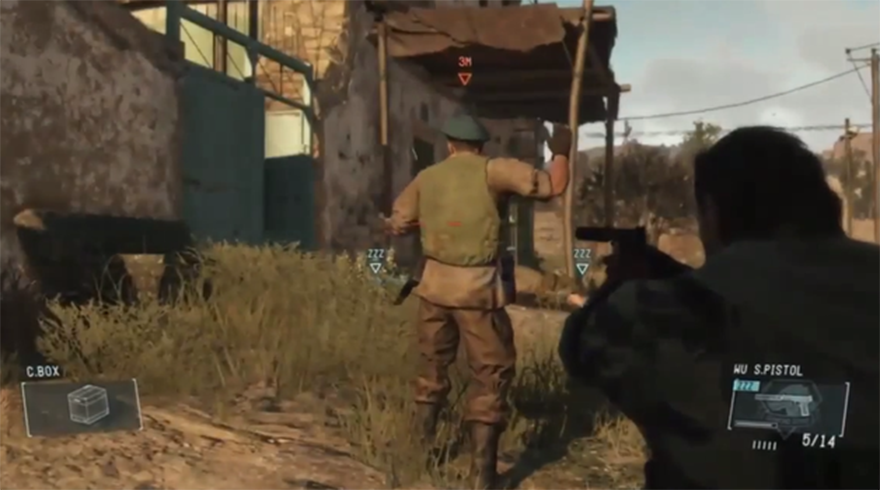Getting Trapped in Metal Gear Solid V’s War Economy

This article was written by Scott Juster and originally published on PopMatters.
It was brought to us by our friends at Critical Distance, who find the best in critical writing about games each week. You can see more at their site, and support them on Patreon.
///
For decades, the Metal Gear series has warned against militarization and nuclear proliferation. “Nukes are bad. Walking tanks that can shoot nukes are worse. Don’t even get me started on private military contractors or nano machines” is a flippant but accurate characterization of numerous 20-minute-long cutscenes throughout the history of the series. Metal Gear Solid V has a very similar theme, but it’s the first time I ever experienced the theme systemically. Instead of listening to characters justify the choices that turned them into warlords, I walked down the road myself.
It starts off innocently enough. I found it fun to run around as Big Boss and head shot as many enemy soldiers as possible. Pillaging outposts and completing missions gives you more money, which translates into the ability to develop cooler weapons by which to head shot the bad guys. I saw some fancier rifles, so I invested money into developing them. Pretty soon I wanted some even cooler toys, so I added mines and grenades to my repertoire. Soon enough even deploying to the battlefield got fairly expensive.

None of this took place in a vacuum. Enemy soldiers began taking counter measures. Playing the game by going for head shots increases the amount of helmets the enemies produce. Using gas leads to gas masks. Night raids lead to night vision goggles. In order to stay competitive, I had to diversify: rocket launchers, machine guns, and mech parts were all added to my increasingly large tab.
All this industrial work required facilities and labor, so Mother Base grew and specialized along with and because of my arsenal. More base facilities sprang up, and in order to put them into operation, I recruited (i.e., conscripted) more soldiers. You can’t have empty factory lines, after all. Of course, in order to fund all of this building in the first place, I needed money, so the whole process became a self fulfilling, ever-inflating cycle. I was making guns to get money, building up facilities with that money, using those facilities to make guns, and then heading back out to make more money on an ever increasing scale.
At a certain point, I realized that I wasn’t alone. Other people were out there building up their bases and expanding their territory. It would be foolish to fall behind, so I annexed new areas and built a new base that would add to my resources. Of course, building and defending this base cost quite a bit of money, but I did what needed to be done.
I needed money, so the whole process became a self fulfilling, ever-inflating cycle.
Then disaster struck. Through a combination of profligate spending, an unavoidable disaster back at Mother Base, and several hostile invasions, I began hemorrhaging money. Soon I was in the red: soldiers were deserting, getting sick, and staying injured longer. I couldn’t build new weapons without furthering my collapse, so I switched over to desperate damage control. I became even more mercenary, sending my squads across the globe to take any mission that would prop up my economy. I neglected the main story and focused on completing as many for-profit side operations as possible. I wasn’t in control of the system any more. I was trapped inside it.
I recovered and learned my lesson. Now my troops are constantly being deployed and rotated around the globe. As the funds roll in, my resources are allocated to ensure that the war economy will chug on in the face of setbacks. I’m on guard and building weapons with an eye towards defending my territory and making plans to invade others. I’m contemplating the final step: building a nuclear weapon. What choice do I have? Everyone else seems to building one.

By the time that I reached the third (!) set of credits, I had unwittingly participated in a series of events that was disturbingly similar to how the history of modern war, industrialism, and colonialism played out in our world. As is the case in today’s society, MGS V is comprised of entities whose very existence is due to and perpetuated by militarization. There’s no way to change this without fundamentally changing the game itself.
MGS V isn’t the first game to comment on the military-industrial complex, but it is probably the sneakiest. Games like Civilization and SimCity are candid about their attempts to model certain aspects of society. The whole point of those games is to explicitly simulate factors that have shaped human development through the rules that guide them. Metal Gear is ostensibly a series about being an action hero. You pull off death-defying stunts and engage in fantastic military tactics. But MGS V does something more. It forces you to interact with the broader system that fuels the action on the battlefield. You may have the ability to shape the course of individual fights, but you’re part of a larger war machine that has spiraled beyond your control.
///
This article was written by Scott Juster and originally published on PopMatters.
It was brought to us by our friends at Critical Distance, who find the best in critical writing about games each week. You can see more at their site, and support them on Patreon.



